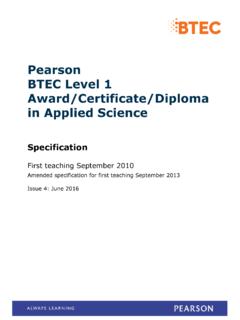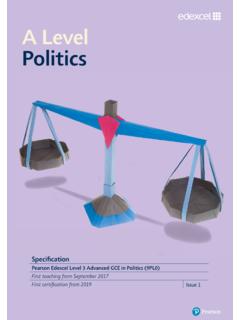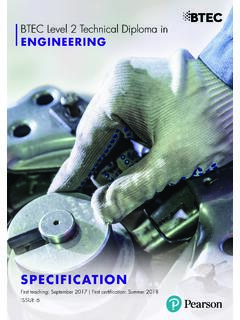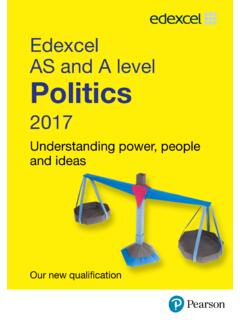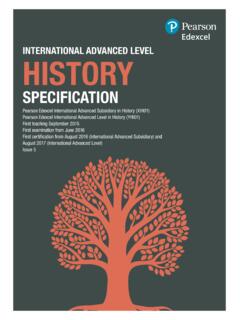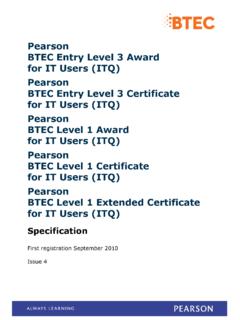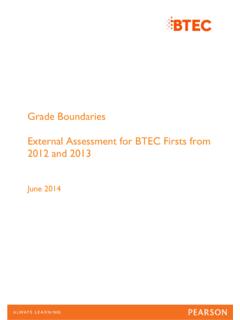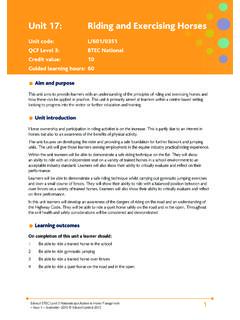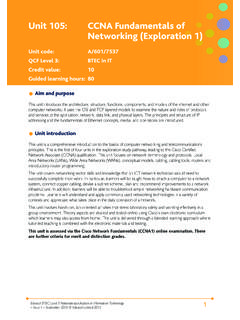Transcription of Pearson BTEC Level 3 Diploma for Residential Childcare ...
1 Pearson BTEC Level 3 Diploma for Residential Childcare (England) Specification Combined (Competence and Knowledge) qualification First registration January 2015 Issue 2 Edexcel, BTEC and LCCI qualifications Edexcel, BTEC and LCCI qualifications are awarded by Pearson , the UK s largest awarding body offering academic and vocational qualifications that are globally recognised and benchmarked. For further information, please visit our qualifications website at Alternatively, you can get in touch with us using the details on our contact us page at About Pearson Pearson is the world's leading learning company, with 35,000 employees in more than 70 countries working to help people of all ages to make measurable progress in their lives through learning.
2 We put the learner at the centre of everything we do, because wherever learning flourishes, so do people. Find out more about how we can help you and your learners at This specification is Issue 2. Key changes are listed in the summary table on the next page. We will inform centres of any changes to this issue. The latest issue can be found on the Pearson website: This qualification was previously known as: Pearson BTEC Level 3 Diploma for Residential Childcare (England) (QCF) The QN remains the same. References to third party material made in this specification are made in good faith. Pearson does not endorse, approve or accept responsibility for the content of materials, which may be subject to change, or any opinions expressed therein.
3 (Material may include textbooks, journals, magazines and other publications and websites.) All information in this specification is correct at time of publication. ISBN 978 1 446 94020 4 All the material in this publication is copyright Pearson Education Limited 2017 Summary of Pearson BTEC Level 3 Diploma for Residential Childcare (England) specification Issue 2 changes Summary of changes made between previous issue and this current issue Section number All references to QCF have been removed throughout the specification Definition of TQT added Section 1 Definition of sizes of qualifications aligned to TQT Section 1 Credit value range removed and replaced with lowest credit value for the shortest route through the qualification Section 2 TQT value added Section 2 GLH range removed and replaced with lowest GLH value for the shortest route through the qualification Section 2 Reference to credit transfer within the QCF removed Section 8 QCF references removed from unit titles and unit levels in all units Section 11 Guided learning definition updated Section 11 Earlier issue(s)
4 Show(s) previous changes. If you need further information on these changes or what they mean, contact us via our website at: Contents Purpose of this specification 1 1 Introducing Pearson BTEC Combined (Competence and Knowledge) qualifications 2 What are Combined (Competence and Knowledge) qualifications? 2 Sizes of NVQ/Competence-based qualifications 2 2 Qualification summary and key information 4 3 Qualification rationale 5 Qualification objectives 5 Relationship with previous qualifications 5 Apprenticeships 5 Progression opportunities 6 Industry support and recognition 6 Relationship with National Occupational Standards 6 4 Qualification structure 7 Pearson BTEC Level 3 Diploma for Residential Childcare 7 5 Programme delivery 10 Elements of good practice 10 Learner recruitment, preparation and support 10 Training and assessment delivery 11 Employer engagement 12 Delivery guidance for Pearson BTEC Level 3 Diploma in Residential Childcare 12 6 Centre resource requirements 14 7 Access and recruitment 15 Prior knowledge.
5 Skills and understanding 15 Access to qualifications for learners with disabilities or specific needs 15 8 Assessment 16 Language of assessment 16 Internal assessment 16 Assessment requirements/strategy 17 Types of evidence 18 Assessment of knowledge 19 Appeals 19 Dealing with malpractice 19 Reasonable adjustments to assessment 19 Special consideration 20 9 Centre recognition and approval 21 Centre recognition 21 Approvals agreement 21 10 Quality assurance of centres 22 11 Unit format 23 Unit title 23 Unit reference number 23 Level 23 Credit value 23 Guided learning hours 23 Learning outcomes 23 Assessment criteria 23 Unit amplification 24 Information for tutors 24 Unit 1: Understand the Development of Children and Young People in Residential Childcare 25 Unit 2: Understand How to Safeguard and Protect Children and Young People in Residential Childcare 36 Unit 3: Understand How to Support Children and Young People Who Have Experienced Harm or Abuse 51 Unit 4: Promote Effective Communication and Information Handling in Residential Childcare Settings 59 Unit 5: Support Risk Management in Residential Childcare 66 Unit 6: Assessment and Planning with Children and Young People in Residential Childcare 73 Unit 7: Support Group Living in Residential Childcare 82 Unit 8: Understand How to Support Positive Outcomes for Children and Young People in Residential Childcare 88 Unit 9.
6 Support Attachment and Positive Relationships for Children and Young People in Residential Childcare 96 Unit 10: Support the Well-being and Resilience of Children and Young People in Residential Childcare 104 Unit 11: Support Children and Young People in Residential Childcare to Achieve Their Learning Potential 111 Unit 12: Support Children and Young People in Residential Childcare to Manage Their Health 120 Unit 13: Support the Development of Socially aware Behaviour with Children and Young People in Residential Childcare 127 Unit 14: Engage in Professional Development in Residential Childcare Settings 137 Unit 15: Support the Rights, Diversity and Equality of Children and Young People in Residential Childcare 144 Unit 16: Participate in Teams to Benefit Children and Young People in Residential Childcare 151 Unit 17: Understand the Care System and Its Impact on Children and Young People 159 Unit 18: Understand the Youth Justice System as It Relates to Residential Childcare 168 Unit 19: Support Young People Leaving Care 178 Unit 20: Understand Residential Childcare for Children and Young People with Complex Disabilities or Conditions 190 Unit 21: Understand Support for Young People with Complex Disabilities or Conditions Making the Transition into Adulthood 199 Unit 22: Work with the Families of Children and Young People in Residential Childcare 210 Unit 23.
7 Support Use of Medication in Social Care Settings 217 12 Further information and useful publications 225 13 Professional development and training 226 14 Contact us 228 Annexe A: Assessment Principles 229 Pearson BTEC Level 3 Diploma for Residential Childcare (England) Specification Issue 2 May 2017 Pearson Education Limited 2017 1 Purpose of this specification This specification sets out: the objectives of the qualification any other qualifications that a learner must have completed before taking the qualification any prior knowledge, skills or understanding which the learner is required to have before taking the qualification the combination of units that a learner must have completed before the qualification will be awarded and any pathways any other requirements that a learner must have satisfied before they will be assessed or before the qualification will be awarded the knowledge.
8 Skills and understanding that will be assessed as part of the qualification the method of any assessment and any associated requirements relating to it the criteria against which a learner s Level of attainment will be measured (such as assessment criteria) assessment requirements and/or evidence requirements required as specified by the relevant Sector Skills Council/Standards Setting Body assessment requirements/strategy as published by the relevant Sector Skills Council/Standards Setting Body the Apprenticeship Framework in which the qualification is included, where appropriate. Pearson BTEC Level 3 Diploma for Residential Childcare (England) Specification Issue 2 May 2017 Pearson Education Limited 2017 2 1 Introducing Pearson BTEC Combined (Competence and Knowledge) qualifications What are Combined (Competence and Knowledge) qualifications?
9 A Combined (Competence and Knowledge) qualification is a work-based qualification that combines competence and technical knowledge to give learners the practical competencies, technical skills and sector-related knowledge they need to be able to carry out a job effectively. Combined (Competence and Knowledge) qualifications are based on the National Occupational Standards (NOS) for the appropriate sector. NOS define what employees, or potential employees, must be able to do and know, and how well they should undertake work tasks and work roles. At Level 2 and above, these qualifications are recognised as the competence component of Apprenticeship Frameworks. Qualifications at Level 1 can be used in Traineeships, which are stepping-stones to Apprenticeship qualifications.
10 Combined (Competence and Knowledge) qualifications can also be delivered as stand-alone for those who wish to take a work-based qualification. Combined (Competence and Knowledge) qualifications are outcome based with no fixed learning programme allowing flexible delivery that meets the individual learner s needs. They are suitable for those in employment and for those studying at college who have a part-time job or access to a substantial work placement so that they are able to demonstrate the competencies that are required for work. Most learners will work towards their qualification in the workplace or in settings that replicate the working environment as specified in the assessment requirements/strategy for the sector. Colleges, training centres and employers can offer these qualifications provided they have access to appropriate physical and human resources.
